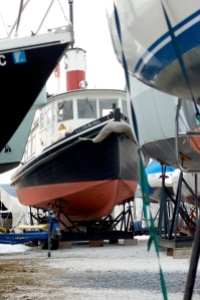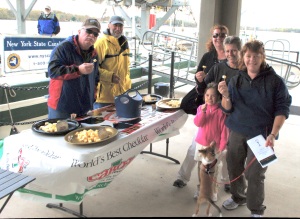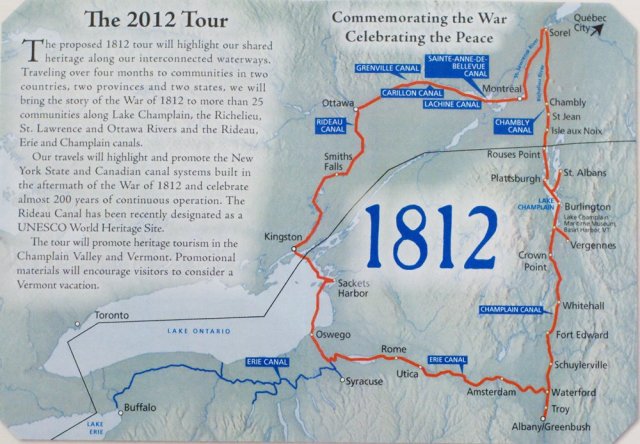by Art Cohn

The now familiar post-tour transition to winter is almost complete. The Lois returned to her winter berth at King Street and the Churchill is back at her long familiar winter quarters at the Shelburne Shipyard. We are developing a list of maintenance chores for these two hard-working wooden boats and hoping that the success of this year’s program and the potential of the proposed program for 2012 will permit a robust infusion of boat repair and enhancements.
With the 2011 season officially concluded, it is with great pride and satisfaction that I report that despite epic floods and hurricanes, the 2011 program “Sailing for Healthy Land and Lake” was a huge success. We safely navigated through a challenging series of weather events and hosted over 10,000 visitors during an adapted schedule.

The weather and its impact caused us to re-schedule in mid-tour, but also allowed us to partner with our friends on the tugboat Urger which added value and dimension to our educational outreach program. Our final stop at Crown Point to anticipate the opening of the new bridge was the perfect culmination to the season. The good feelings, shared accomplishments and high crew and volunteer moral has provided a strong platform to begin to envision next seasons tour opportunities.
It gives me satisfaction to share with you our plans for 2012; an ambitious four-month travel program that would embrace the theme of “1812: Commemorating the War; Celebrating the Peace.”
The War of 1812 was a conflict that reached across the Atlantic Ocean and engulfed the fledgling United States and Great Britain in what many have likened to a second War for Independence. The conflict emerged out of an intense struggle between Napoleon’s France and Great Britain and the British need to maintain their navy. This strategic need led Great Britain to more aggressively use a desperate practice of taking sailors off American ships to supply the never-ending need for men to supply their indispensable navy. America’s declared neutrality was no insulation to these “impressments” of sailors and interference with American commerce. The practice strained already weak relationships and led to a series of widely reported conflicts between the Royal Navy and its American warships that fanned the flames of war. The American “Embargo Acts” of 1807 forbidding American trade with Great Britain crippled Champlain Valley trade with British Canada and was met with scorn by a large segment of the population on both sides of the border. The Embargo stimulated an intensive cross-border maritime smuggling effort. By June of 1812, a tragic series of political missteps and miscommunications led the United States to declare war on Great Britain.
Next June will mark the 200th anniversary of the American declaration which began the War of 1812 and, like all anniversaries, it provides an opportunity to remember and reflect on the event. For the Lake Champlain Maritime Museum and her Lois McClure outreach crew, it provides an ideal opportunity to re-examine the War of 1812 in the Champlain Valley and explore how the war was played out in our part of the world. It allows us to examine our cultural connection with Canada, a shared heritage we first explored during our 2008 visit to Quebec to commemorate Samuel de Champlain’s travels.

1812, Commemorating the War: Celebrating the Peace, would provide an opportunity to return to Canada and explore the origins of the War of 1812 and its impact on communities on both sides of the border. We plan a 4-month journey that would bring us north into the Richelieu River and St. Lawrence corridors to Montreal before heading to Ottawa, the Rideau Canal and Kingston, the British Naval base on Lake Ontario during the war. Crossing Lake Ontario, we will visit Sacket’s Harbor, the American naval base before entering the New York canal system at Oswego for our return leg home. We plan to stop at many places that figured prominently in the War and present results of recent shipwreck studies on War of 1812 vessels from the lakes. We also plan to attend the Waterford Tugboat Roundup, canceled this year because of Hurricane Irene and scheduled for September 7-9, 2012.
Over the winter I hope to provide an occasional blog to bring the planning up to date. I am also pleased to share with you that a long effort to convert previous season logs and blogs to a new publication about “The Travels of the Canal Schooner Lois McClure” is in the final stages of preparation and we hope for a summer 2012 release.
Lastly, on behalf of the crew of the Lois McClure I want to thanks all of our volunteers, sponsors, community supporters and well wishers who went above and beyond the call of duty to make 2011 such a successful year and put us on the road to future mission-meeting adventures.
Art Cohn

2011 was a tough year for many in Vermont. LCMM adapted very well with constant schedule changes and still made a great educational impact on the public. I am looking forward to 2012 schedule and hope the weather cooperates. As details emerge I will be making plans to once again volunteer crew aboard The Lois McClure. I am anxiously awaiting news of the schedule. It sounds like another “epic” journey.